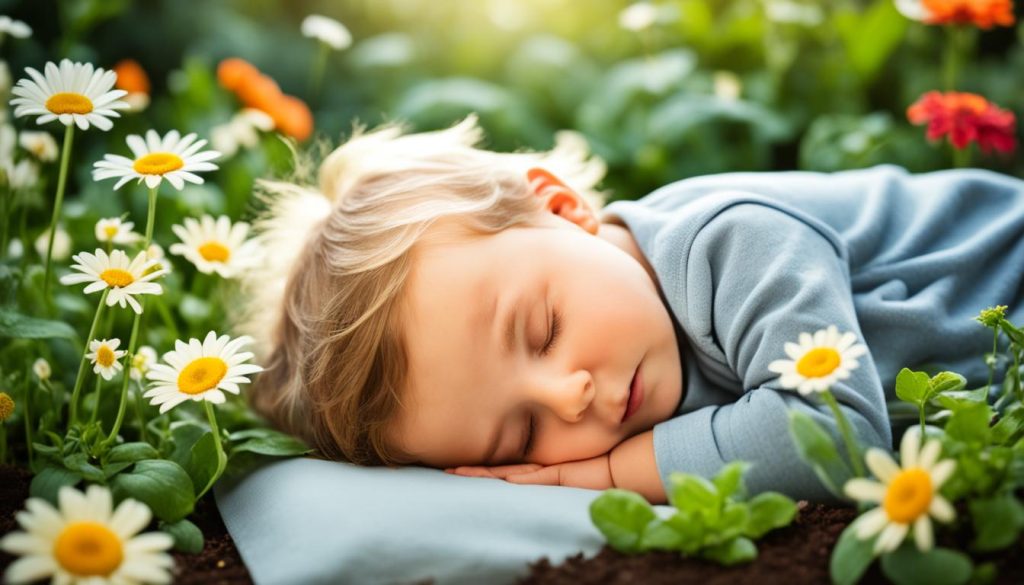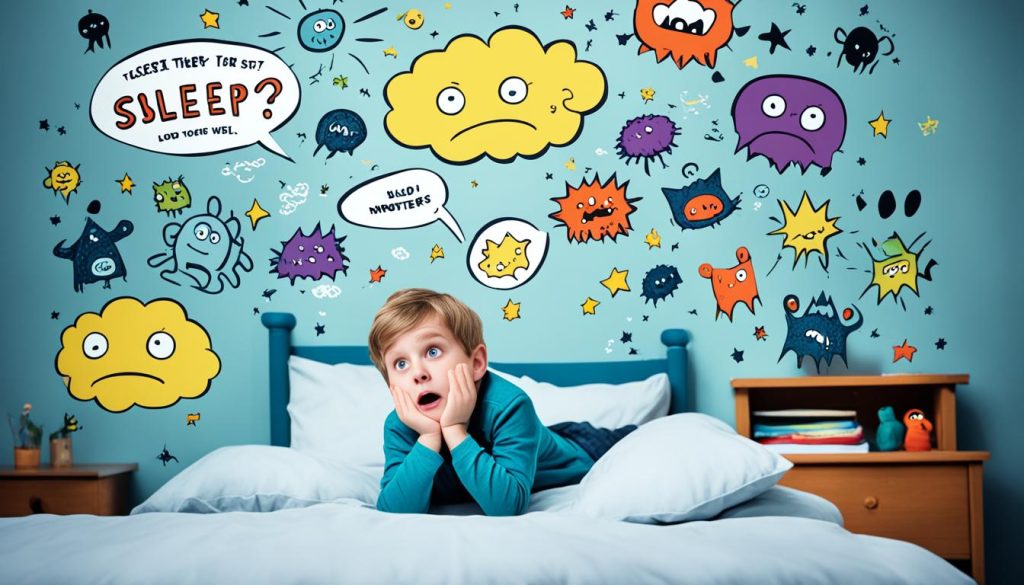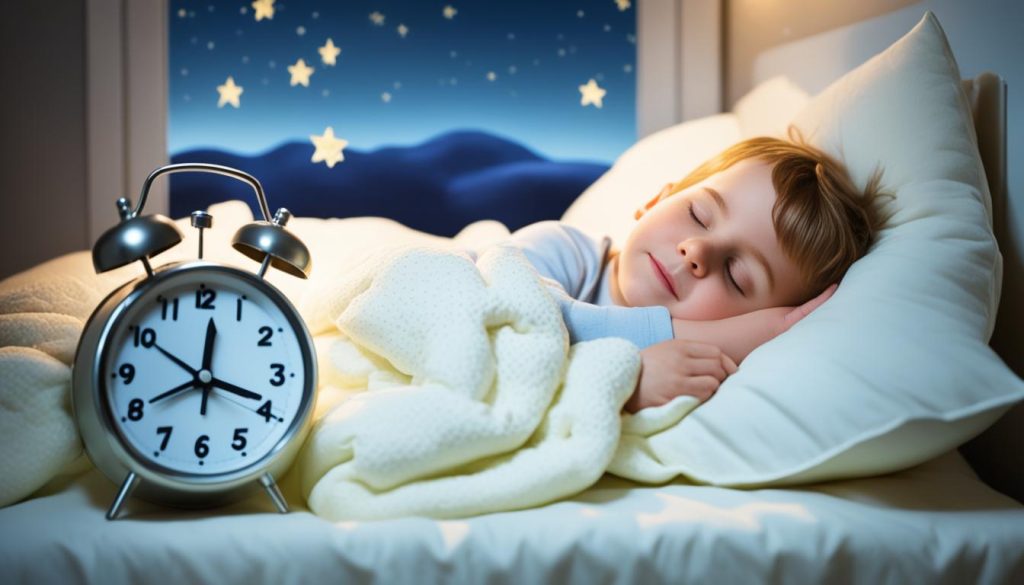Remember when your little one would fall asleep easily in your arms, their breathing calm and steady? Now, trying to get them to sleep can be tough, balancing their busy lives with bedtime routines. You know how crucial sleep for kids is, but modern life makes it hard to ensure they get enough rest. The National Sleep Foundation says many kids and teens don’t sleep enough, affecting their health, mood, and school work. Finding the right sleep habits can seem tough, but knowing the basics is key.
Helping your kids develop healthy sleep habits is a big part of parenting. As they grow, so does their need for sleep, and we must adjust to meet those needs. It’s about setting a regular bedtime routine and making their sleep space ideal. Seeing them reach child development milestones and knowing they’re recharging is rewarding. Sleep is crucial for their growth, both in body and mind.
Key Takeaways
- Consistent sleep schedules are crucial for children’s health.
- Adequate sleep contributes significantly to mental and physical growth.
- Poor sleep can impact mood, behavior, and academic performance.
- A nurturing sleep environment and bedtime routine are essential.
- Consult a pediatrician if sleep issues persist for more than a few weeks.
Understanding the Sleep Needs of Different Age Groups
To help children grow up happy and healthy, it’s key to know how much sleep they need at different ages. Sleep needs change a lot from newborns to teens. We must consider these changes to help kids develop a growth mindset, meet their nutritional needs, and build healthy habits.

Newborns and Infants
Newborns sleep 16 to 18 hours a day from birth to 3 months. This time is crucial for their growth and brain development. By 4 to 12 months, they need 12 to 16 hours of sleep, including naps. Sadly, 37.6% of 6-month-olds and 27.9% of 12-month-olds don’t sleep for six hours straight. Starting regular sleep routines early can really help these numbers.
Toddlers and Preschoolers
Toddlers, aged 1 to 2 years, need 11 to 14 hours of sleep daily, including naps. As they grow into preschoolers (ages 3 to 5), they need a bit less, about 10 to 13 hours. Keeping a consistent sleep schedule is important for these kids. It helps them stay well-rested and emotionally balanced.
School-Aged Children and Teenagers
School kids (6 to 12 years) should get 9 to 12 hours of sleep each night. Teenagers (13 to 18 years) need 8 to 10 hours to stay healthy. It’s crucial to understand and support each child’s unique sleep habits to help them grow mentally.
| Age Group | Recommended Sleep |
|---|---|
| Newborns (0-3 months) | 16 to 18 hours per day |
| Infants (4-12 months) | 12 to 16 hours per day, including naps |
| Toddlers (1-2 years) | 11 to 14 hours per day, including naps |
| Preschoolers (3-5 years) | 10 to 13 hours per day |
| School-aged Children (6-12 years) | 9 to 12 hours per day |
| Teenagers (13-18 years) | 8 to 10 hours per day |
Adjusting to your child’s sleep needs supports their growth and health. It helps with their mental and physical health. Good sleep habits also help meet their nutritional needs, leading to well-rounded, happy kids.
Why Sleep is Crucial for Child Development
Getting enough sleep is key for kids’ growth in many ways. It helps with both their minds and bodies. It also helps them manage their feelings and behave well.

Mental and Physical Growth
Sleep is when the body and brain grow and repair. It releases growth hormones and cleans the brain. This helps kids stay focused, think better, and be more creative.
Not sleeping enough can hurt their heart health and overall well-being. Studies show that too little sleep can lead to heart problems in kids and teens. Sun et al. (2020) found that short sleep times are bad for the heart. Owens et al. (2014) also showed how not sleeping enough affects teens and young adults.
Emotional Regulation and Behaviors
Sleep helps kids control their feelings, making them less moody and anxious. It makes them better at handling emotions and social situations. This is important for Emotional Intelligence in Children.
Good sleep also teaches kids to follow routines and take care of themselves. El-Sheikh and Kelly (2012) found that family stress affects kids’ sleep. Kelley et al. (2014) showed that family conflicts can make kids more emotional. A good sleep setup can help kids stay mentally healthy.
| Age Group | Average Sleep Needed (Hours) | Key Benefits |
|---|---|---|
| Newborns (0-3 months) | 14-17 | Supports initial brain development and growth hormone release |
| Infants (3-6 months) | 12-15 | Continues mental and physical growth, begins memory consolidation |
| Toddlers (1-2 years) | 11-14 | Aids in emotional development and learning new skills |
| Preschoolers (3-5 years) | 10-13 | Enhances cognitive growth, reduces emotional irregularity |
| School-aged (6-13 years) | 9-11 | Boosts academic performance, supports physical health |
| Teenagers (14-17 years) | 8-10 | Improves mood regulation, increases focus and problem-solving skills |
| Young Adults (18-25 years) | 7-9 | Supports mental stability, improves social interactions |
Common Sleep Disorders in Children
It’s crucial to understand sleep disorders to help your child stay healthy. Up to 30% of children struggle with sleep issues, which can affect their energy and how they interact with others during the day.
Obstructive sleep apnea (OSA) affects 1-5% of kids. If your child snores often, it could be a sign of OSA. This condition can cause serious health problems if not treated. Talk to your child’s doctor if you notice snoring.
About half of children experience parasomnias like sleepwalking or talking in their sleep. These can disrupt both their sleep and yours. Setting a regular bedtime routine can help reduce these problems.

Some kids might have trouble falling or staying asleep, known as insomnia. Improving communication with your child can help. Nightmares are common in toddlers and preschoolers. Talking about their fears can help them feel safer.
If your child has ongoing sleep problems, they might need to see a doctor. A general practitioner, pediatrician, or sleep specialist can help. In some cases, medication is needed, but it’s usually given with careful monitoring. Surgery like adenotonsillectomy can help fix OSA in most normal-weight kids.
Dealing with tantrums and helping your child develop social skills is linked to their sleep health. Parents and caregivers are key in creating a good sleep environment. Using the right discipline can help with sleep issues and support your child’s overall growth.
How to Establish a Healthy Sleep Routine
It’s key for kids to get enough sleep for their growth and well-being. Being consistent and having calming activities before bed helps kids know it’s time to sleep. Using Positive Parenting helps set and keep up with sleep habits.

Creating a Consistent Bedtime
Setting a regular sleep schedule for kids is crucial, even on weekends or in summer. Babies need 14–15 hours of sleep, toddlers 12–14 hours, and preschoolers 11–13 hours. School kids need 10–12 hours, and teens 8–10 hours.
It usually takes three to four days for kids to adjust to a new sleep routine. Keeping the bedtime schedule steady helps kids sleep better.
- A bedtime routine should start 30–60 minutes before bedtime.
- Turn off all screens to reduce blue light exposure.
- Avoid beverages with high sugar or caffeine content in the evening.
- Keep the bedroom temperature between 67 and 69 degrees Fahrenheit.
Developing a Calming Pre-Sleep Ritual
Having a calming pre-sleep routine tells kids it’s bedtime. Activities like taking a bath, reading, or reflecting can help them relax. Positive Parenting helps set these routines by setting boundaries and building self-esteem.
| Age Group | Recommended Sleep Hours |
|---|---|
| Infants (0–12 months) | 14–15 hours |
| Toddlers (1–3 years) | 12–14 hours |
| Preschoolers (3–5 years) | 11–13 hours |
| School-Aged Children (5–12 years) | 10–12 hours |
| Teenagers | 8–10 hours |
A quiet, comfy bedroom is key for good sleep. Positive Parenting helps kids sleep better by setting boundaries and building self-esteem.
The Role of Nutrition and Exercise in Sleep Quality
A balanced diet and regular exercise are key for good sleep in kids. In the U.S., kids get about 70% of their calories from ultra-processed foods. These foods can hurt their sleep and health. To help kids sleep better, eating whole foods and cutting down on processed foods is important.
Healthy habits of moms can also help kids eat better. When moms eat a diverse diet, kids are more likely to eat nutritious foods as they grow.
Regular physical activity helps kids get tired, making them sleep better. Studies show that being active fights childhood obesity and improves sleep. The PASOS study shows how moving more and sitting less helps kids sleep better.
Teaching kids healthy eating habits is important. It might take kids up to 15 tries to like a new food. Parents can help by making meals balanced with lots of fruits and veggies. This is similar to the Mediterranean diet, which is linked to a better life quality.
Creating a routine with healthy eating, screen time, activities, and exercise helps kids sleep and stay healthy. This balance is key for good sleep and well-being.
FAQ
Why is sleep important for kids?
How much sleep do children need at different ages?
How does sleep affect mental and physical growth in children?
What are common sleep disorders in children?
How can I establish a consistent bedtime routine for my child?
What role do nutrition and exercise play in sleep quality?
How can I support my child’s emotional regulation through healthy sleep habits?
How do I know if my child has a sleep disorder?
Can screen time affect my child’s sleep quality?
What are some activities that can be included in a pre-sleep ritual?
This post contains affiliate links. If you click on a link and make a purchase, I may earn a small commission — at no extra cost to you. Thank you for supporting this blog and helping me keep the patterns free! Read the full Affiliate Disclosure & Transparency.
